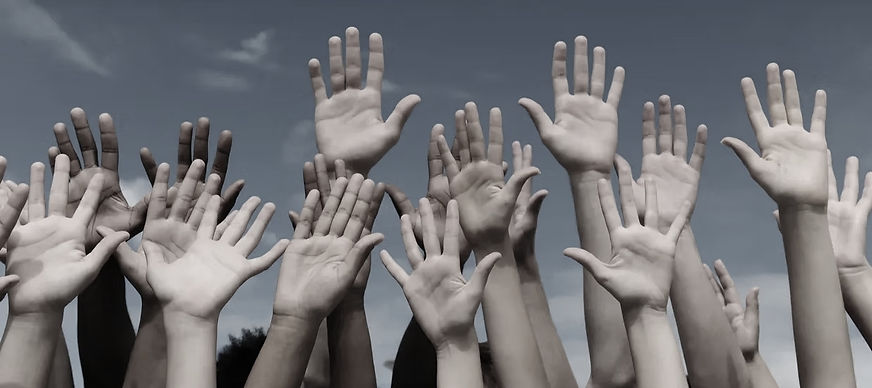

Solidarity Dialogues
Strengthening our Shared Spaces in Times of Conflict
Est. 2024 | Ongoing Project
The Solidarity Dialogues is a community-led project that addresses the impacts of deep-rooted conflicts, and the resulting tensions, fears, and polarizations they create in Canadian communities, including schools/universities, workplaces, religious communities, and civil society organizations.
Polarization threatens an essential pillar of democracy – civil discourse – that relies on influential voices within communities to promote Canadian values of tolerance and diversity. Through training and mentorship, the program equips leaders to design, organize, and facilitate dialogue sessions within and between divided groups, providing pathways for diverse voices to be heard, creating mutual understanding and empathy, and fortifying peoples’ resilience and ability to respond to conflict.
Rooted in anti-oppressive practice and liberation pedagogy, the project is informed by lived experience and accountable to communities most impacted by systemic and colonial violence. We are intentional in how we use the term dialogue. At its core, dialogue, hiwār (حوار) in Arabic, meaning “seeking understanding” is a transformative practice that moves individuals and communities from confusion toward learning, connection, and shared humanity. It is not about persuasion or winning agreement, but about engaging complexity with openness and care. Through empathetic listening, dialogue becomes a continuous process that builds trust and enables conflict transformation over time. Grounded in Paulo Freire’s pedagogy of liberation, dialogue is understood as an act of mutual learning in which all participants are equal co-learners. It intentionally centers marginalized voices, challenges systems of oppression, and restores human dignity. Through this process of rehumanization, dialogue cultivates critical consciousness and creates the conditions for lasting individual and collective change, critical consciousness, solidarity, and social justice.
The Solidarity Dialogues are implemented in partnership with the Peace Network for Social Harmony and follow a sustainable, partnership-driven model, working with organizations to implement locally rooted solutions.

Project Objectives
-
Strengthen participants’ capacity to navigate polarization and conflict by equipping them with dialogue tools grounded in anti-oppressive practice, enabling safe and brave conversations that confront power rather than avoid it.
-
Facilitate sustained intergroup dialogue across sectors and communities in Canada to address polarization constructively, deepen mutual understanding, and support collective responses to systemic injustice.
-
Advance public understanding of solidarity, shared responsibility for justice, and non-violent freedom of expression through dialogue-centered public education and knowledge-sharing initiatives.
-
Convene an annual public gathering for solidarity in Canada, led by project participants and supported by respected public figures, to model dialogue as a praxis for social justice and democratic engagement.
Solidarity Dialogues Goal
The goal of the Solidarity Dialogues is to create sustainable and replicable mechanisms that add to the resilience and solidarity of Canadian communities in times of conflict, polarization and deep-rooted divisions, by creating spaces for open and safe dialogue, involving inclusive and constructive discourse, and resulting in increased mutual understanding, solidarity and shared responsibility for justice.

Solidarity Dialogues Participant Spotlitght
Media Highlight
Recognition of the Solidarity Dialogues: Canada’s Action Plan on Combatting Hate
Media Highlight
Global News: Montreal community group launches project to ease tension, by Phil Carpenter
Publications and Outputs

Statement of Solidarity - Montreal
In response to the increased tensions, polarization, and fear among different communities in Montreal due to the intensification of geopolitical conflicts, Dr. Amal Elsana Alhjooj (PLEDJ Founder and Executive Director) and Mr. Brian Bronfman (Founder and President of the Peace Network for Social Harmony) issued a joint Message of Solidarity from Civil Society, calling for unity, respect, and social harmony, while firmly rejecting hatred, intimidation, and any form of violence as a mode of self-expression. This message brought together a broad and diverse group of signatories, including prominent figures from across sectors of Montreal’s civil society: Robert Charlebois, Fabienne Colas, Kevin Deer, Thupten Jinpa, Phyllis Lambert, Farida Mohamed, Andrew Molson, and Fabrice Vil, among others.
Following its media release, a press conference was held on Tuesday, December 12th, 2023, to publicly present the statement and to begin charting a path from words to action. Several signatories spoke about the urgent need to foster respectful dialogue and uphold shared values of coexistence during times of tension.
This gathering lit the flame that would go on to spark the creation of the Solidarity Dialogues.
The Launch of the Solidarity Dialogues
On May 22, 2024, over 80 people gathered in Montreal to celebrate the launch of the Solidarity Dialogues. To mark the occasion, PLEDJ hosted a panel discussion on using dialogue as a tool against polarization and broadcast it online as the first webinar of the series. We were honoured to welcome the following changemakers to join the panel discussion: Dale Dione, Indigenous community leader and specialist in restorative justice.
Rabbi Lisa Grushcow, Senior Rabbi at Temple Emmanu-El-Beth Shalom, with a long history of interfaith bridge-building. Imam Hassan Guillet, founding member of the “Table interreligieuse de concertation du Québec,” which builds bridges between communities of faith in Quebec. Patrice Brodeur, Associate Professor at the Université de Montréal with extensive experience in interfaith dialogue.
The panelists brought diverse backgrounds and expertise, discussing and exchanging ideas on how we, as community members, can transform shared spaces into ones of unity and
understanding. It was a powerful event, leaving guests feeling inspired and hopeful
“Il faut connecter avec la personne à un niveau profondément émotionnel et spirituel dans le sens humain.”



